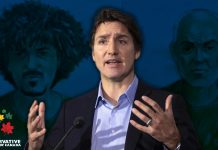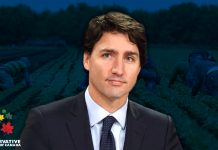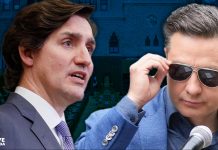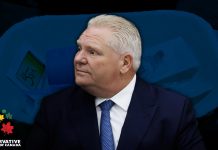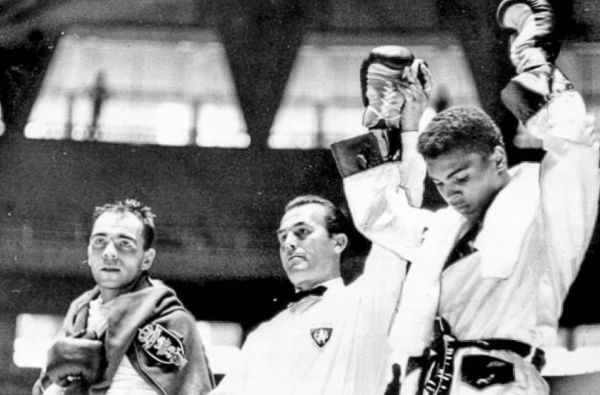The metaphor of the boxer who takes on the opponent who underestimates him, and comes out on top, works for Justin Trudeau – until it doesn’t.
Paul Wells. Justin Trudeau On the Ropes: Governing in Troubled Times. Sutherland House, Toronto, 2024.
101 pp.
Review by Matthew Rowley
“Years later another fight of a different kind took place. The old champion, Prime Minister Stephen Harper, had won many fights in the electoral ring, and was looking for an easy walkover with the young upstart, Justin Trudeau. Trudeau was a loud-mouthed young kid who loved the spotlight, and most people did not give him much of a hope of wrestling the title away from the champion.”
Sonny Liston was World Heavyweight boxing champion in 1964. No one could stand against him. He had knocked out the previous champion in the first round of a fight not once, but twice. He was on top of his game, and, as boxing promoter Harry Conrad said, “when Sonny gave you the evil eye—I don’t care who you were—you shrunk to two feet tall.” Cassius Clay (later to change his name to Muhammad Ali) was a 22-year-old nobody, known as the “Louisville Lip” because of his glib, fast-talking ways. A lover of the spotlight, he had already had a mixed record of being almost beaten in numerous fights but had come back off the ropes and won each time. Now he was taking on the champion. In six rounds he pounded the older, more experienced fighter into submission, walking away with a championship and starting the legend of Muhammad Ali, one of the greatest boxers of all time.
Years later another fight of a different kind took place. The old champion, Prime Minister Stephen Harper, had won many fights in the electoral ring, and was looking for an easy walkover with the young upstart, Justin Trudeau. Trudeau was a loud-mouthed young kid who loved the spotlight, and most people did not give him much of a hope of wrestling the title away from the champion.
Yet in a long election campaign, Trudeau slowly began to beat the champion down. In a party leaders debate hosted by Paul Wells of Maclean’s magazine, as Harper staggered from defence to defence on his climate record, the young upstart Trudeau finally landed a devastating blow: “Mr. Harper, no one believes you on the environment.”
The picture of an underdog boxer, backed up against the ropes, throwing punches and trying to hold off his enemies, is a powerful one. It is one that Justin Trudeau has tried to cultivate for himself, and one that Paul Wells uses to frame his short political biography of Trudeau. But in less than a hundred pages Wells also paints a picture of a politician who is great on the hustings, excellent when things are shallow and superficial, but who struggles with the boring business of effectively governing a country of 40 million people. Throughout the story, we see Wells’s long and personal experience with Trudeau and Ottawa, as a national political columnist for more than twenty years, as well as the author of two books on Stephen Harper. It is this experience – and the absence of the standard, biased (Liberal) Ottawa Press Gallery political narrative – that makes Wells’ book so compelling.
It was a moment that defined a new man and a new kind of fight. Trudeau went from underdog, desperately fighting with his back to the ropes, to winner of a solid majority government. The old champion had been beaten by the brazen upstart.
Wells titles his narrative based on the story of the famous boxing match held between Trudeau and Patrick Brazeau, a Conservative senator, in the spring of 2012. Through diligent preparation and tenacious work Trudeau was able to defeat the karate black belt Brazeau, who was the favourite to win the fight. And he did not simply defeat the senator, but also set up a metaphor that has been used to explain Justin Trudeau’s political career ever since: When Trudeau is on the ropes he does not give up, but he fights harder. “I am told that Trudeau keeps the boxing match in his head as a reference, a model. Every time he’s in trouble he thinks, “I’ve been in trouble before and they were wrong to count me out.” In Justin Trudeau’s mind, he will always be able to come out on top, defeating all odds.
Beginning with Trudeau’s journey to election as a Member of Parliament, Wells takes the reader on an insightful journey into the political history of the PM. Most interesting to the reviewer were the signs that Wells saw of Trudeau’s long-held ambitions, not just to become an MP, but Liberal party leader and Prime Minister.
Through the ups and dramatic downs of his early career, Trudeau kept his sights on a higher goal, and was rewarded with a massive first round leadership win. Wells rightly credits this as an incredible accomplishment for someone who was really a political rookie, having never served in government.
Wells goes on to detail the early optimism and legislative success that followed the Trudeau government, as they scored quick victories on the legalization of marijuana, and the very successful Universal Child Benefit.
The book goes on to detail the rapid decline of the government into struggles and scandals, leading to the 2019 election where Trudeau’s Liberals are reduced to a minority in Parliament. This was an unprecedented campaign, where revelations of Trudeau’s youthful penchant for dressing up in blackface left many thinking that he was out of the fight and out of politics for good. Despite this blow he was able to hold together a bare victory.
Through the second mandate that ended with a snap election in the autumn of 2021, held during the Covid-19 pandemic, Trudeau endures (or commits) regular scandals such as the massive WE Charity debacle, adding to a long string of governance failures.
Trudeau’s government begins to look tired, inflexible, and insular, with the only bright spots coming from his ability to polarize and divide the electorate in such a way that he emerges from the third campaign still with a firm grasp on power.
This narrative Wells conveys, of an effective electioneering machine that cannot govern well becomes the true underlying theme, showing an inherent weakness despite the surface strengths.
While on the surface Trudeau may be an underdog winning against all odds, underneath he is revealed to be a cold and calculating person, able, for example, to mock an Indigenous woman who complained about mercury poisoning in her reserve’s drinking water, or destroy the career of the nation’s first indigenous female attorney-general, when she dares to defy his will.
In every step of the book Wells is not only providing a biography, but also the kind of analysis that only comes about through years of being at the very centre of the political journalism scene in Ottawa. His connections with people in and around Parliament Hill mean that he speaks from personal knowledge and extensive experience, not only of those around Trudeau, but the PM himself. Indeed, as he mentions, he has been personally connected to the story of Trudeau as a journalist and media personality, even hosting the critical debate between Harper and Trudeau in the 2015 election. This personal knowledge makes the book even more compelling, and the critique even more devastating.
Wells portrays Trudeau as a real person, an “introvert who has become skilled at pretending the contrary.” Wells further argues that Trudeau has been able to build a career on first impressions, to use his athletic good looks and charm to make his way even against stiff opposition.
Wells is remarkably generous to Trudeau, telling the reader that he prefers to give the benefit of the doubt to a leader who has won multiple elections and stayed in power for almost a decade, believing that there must be something there that sets Trudeau apart from the herd.
Wells argues that Trudeau is perceptive and emotionally direct, able to connect with people on a personal level and give them a sense that they are seen and understood. He also sees times in the past when Trudeau has shown self-awareness, citing examples of Trudeau recognising his own weaknesses. Intriguingly, given the public image presented by Trudeau, Wells tells us that Trudeau can take criticism as he works to govern. He tells us that numerous serious and non-partisan people recognize these qualities, and certainly Wells does not speak as a partisan himself.
This was effective for Trudeau in the early years of his government, when people were generally in favour of the first impression, and when Vogue was doing photo shoots accentuating this new progressive darling. Well’s insights are significant here, especially for political opponents wishing to correctly evaluate the PM, to avoid that underestimation and the unexpected knockout blow that sealed the fates of Stephen Harper, Tom Mulcair, Andrew Scheer, and Erin O’Toole.
Trudeau is presented as one who truly believes the progressive messages he preaches, So he can be led by this extreme sincerity and his belief in his personal correctness to brand those who disagree with him as unacceptable or beyond the pale. Such was the case recounted by Wells where Trudeau declared Andrew Scheer, the Conservative Opposition Leader, to have “disqualified himself from constructive discussions with his unacceptable speech” because of Scheer’s principled remarks about protesters blocking railroads and other infrastructure. Even more egregiously, only a week later, Trudeau was making essentially the same statements that Scheer had, showing his moral indignation to be merely performative.
Wells’ generosity is certainly overdone at points. He attributes qualities or attitudes to Trudeau that are likely worse motivated than a generous interpretation would find.
Especially questionable is Wells’s assertion, based upon a 2012 interview, that Trudeau “sees his weaknesses clearly.” This assertion is incredibly hard to sustain, given Trudeau’s method of engaging with any of his weaknesses that make it to the public eye. Trudeau’s customary approach in these cases is to dodge, obfuscate, and in the end give grudging half apologies that centre on the need for everyone else – “all Candians” – to learn a lesson from his actions.
Since the byelection in Toronto – St. Paul’s in June, where his Liberals lost to the Conservatives in a riding they had held for more than 30 years, Trudeau has been especially stubborn in refusing to admit his weaknesses, or that they are dragging his whole party down.If he may have had this self awareness in the past, or perhaps maintains it in private, in public he is stubbornly unable to admit fault or weakness.
Wells presents a picture of a Prime Minister who loves to be in the public eye, loves the campaign and the thrill of the hunt, but dislikes many of the mundane aspects of the job once he‘s secured it.
“(Trudeau’s governing method)… is to just keep announcing stuff, as though the announcements themselves were the point.” He loves the kudos that come with announcements, but then allows things to be quietly set aside, such as his promise to plant two billion trees in Canada. The Trudeau method of governing, as Wells reveals, is to continually find ways to maximise the electoral coalition that will win the next round.
Almost everything that is done by the Trudeau PMO is an attempt to bring back the glory days of adulation and popularity that followed his first victory, when he was the darling of the world’s media and progressive leaders, and when all he had to do was flash his socks to cause adoring journalists to swoon.
“There are two ways to manage over the long haul,” Wells writes. One is to be managerial. The other is to defy the long haul by trying eternally to recapture the excitement of your first victory. Justin Trudeau is the second type.”
Every governing decision, announcement, and initiative seems to be directed not to good governance, but rather to this attempt to refine Trudeau’s electoral coalition. When challenged on things like monetary policy he is revealed to be uniformed and even dismissive of the necessity of those elements of governance. Wells has grasped the effective limitations of Trudeau’s government and style of governance, presenting him as an excellent electioneer, as a great one for talk and dramatic symbolism, but lacking on the actual substance that makes a serious and effective Prime Minister.
In addition to this single-minded determination to win elections, another key aspect of Trudeau’s personality and political style revealed by Wells is his naivete. In his early days as PM he seemed to believe that he could take a trip to a foreign capital and get anything he wanted, with just his name and smile. Wells shows examples where trips to the United States and a visit to Ottawa by UN Secretary General Ban Ki-Moon’s were notable examples where diplomacy by personality seemed to carry the day. But, as world leaders got to know Trudeau and his methods, this honeymoon soon ended. His ultimate failures were trips, first to China and then India, where he singularly failed to gladhand his way to victory and embarrassed himself and the country. While he might be able to win when underestimated, once he comes up against experienced high-level professionals who understand the man and had his measure, he goes down hard in the first round.
As the platitudes and smooth progressive slogans have given way to scandal and economic hardship for ever greater numbers of Canadians, Trudeau has resorted to even more talk to change the narrative: “Trudeau has built a government that can’t stop announcing bright new days,” Wells writes, “even though it seems increasingly unable to deliver.” And the longer the government has survived, the more the early days of “government by cabinet” has given way to a rigid control of every aspect of government from the PMO.Any cabinet ministers who attempt to take their own line or offer objections to the Trudeau plan quickly find themselves pursuing a new line of work.
Wells tracks these changes effectively, pointing out the notable wins, but also the drastic gap between what is said and what is done on many different fronts. Wells is especially effective in highlighting the contradiction between words and deeds that occurred around the SNC Lavalin scandal in which Trudeau chose to fire his Minister of Justice, Jody Wilson-Raybould, because she refused to interfere in a criminal prosecution the way he and his staff thought she should.
Wells further illustrates Trudeau’s failings as a Prime Minister by showing his struggles with the actual business of parliament. Trudeau gets easily frustrated at the slow pace of the House and the ability of the opposition to slow his agenda through procedural methods. In 2016, he famously elbowed Ruth-Ellen Brousseau, a female NDP MP, as he tried to speed opposition members to their seats so that a recorded vote could move forward. He also has become famous for his non-answers in Question Period, refusing to address the specific questions posed by the opposition in favour of reciting talking points written for him in advance.
Wells’s book also digs into the fundamental shift that Trudeau has wrought in the Liberal Party. All the old Chretien and Martin Liberals who served with the respected elder statesmen have been removed from power, replaced by young, idealistic and inexperienced people who have both moved the party drastically leftwards, and remade it into the Justin Trudeau party. The core of the Liberal party now depends upon Trudeau for its existence. Trudeau has reengineered the Liberal Party, creating a powerful incentive to remain united behind him . This will have significant consequences for the party and for Canada in the coming years.
Wells writes: “It would be possible to imagine Trudeau coming back yet again (from defeat) if he had lately shown any inclination toward introspection or humility, or a driving urge to improve his game. In the absence of those qualities, bad habits become entrenched.”
Given the results of the Toronto – St. Paul’s byelection, and Trudeau’s complete inability to raise his game in response, we perhaps find not a fighter on the ropes, but one who is already on the ground and too punch drunk to know it. Wells ends the book by wishing the country had a PM who better fit Trudeau’s own ideal as stated in his 2015 victory speech: “You want a prime minister who knows that if Canadians are to trust their government, their government needs to trust Canadians, a PM who understands that openness and transparency means better, smarter decisions.” Wells correctly sees that the Prime Minister has not been walking this talk himself for many years.
Muhammad Ali’s last fight was a very different story from his first. In 1980, well past his prime, he decided to step into the ring one last time, taking on Larry Holmes and proving he was still the greatest. His closest friends and his doctor told him not to do it, his age and fitness were against him, but he refused to heed the warnings and went for the fight. When the day of the fight came, a sluggish Ali was dominated by Holmes through every round, and his great record was damaged forever as he was knocked out on his feet.
Justin Trudeau has been a wonderful champion for the Liberal Party. He has managed to win three championship matches in his almost decade as Prime Minister. But the champion is looking old and tired. He doesn’t react quickly; he cannot seem to respond to the realities that are plaguing Canada at present. His all-show, no substance approach is wearing thin even among die-hard fans.
And there is a new challenger, waiting in the wings, young and strong and ready to get into the ring with him, in the person of Pierre Poilievre Though Trudeau has been the underdog in the past, in this fight he has the potential not only to destroy his personal legacy, but also to take the Liberal Party down with him, to a defeat of unprecedented scale and leave it forever tarnished.
Wells shows us that the metaphor of the boxer who can take on the opponent who underestimates him and come out on top does not always work in the case of Trudeau. For those who have the measure of the man – foreign diplomats in China or India, for example, the story is very different as they emerge from the ring.
So it may be with Pierre Poilievre as well. The final round of Justin Trudeau’s career remains perhaps to be fought, but we can be assured that Wells will be there at the final bell to provide us an insightful play-by-play. For those who want to better understand the fighter in the red trunks, Trudeau on the Ropes is a must-read.

Matthew Rowley is president of Training Leaders International Canada, an overseas teaching organization. He holds a Bachelor of Theology from Clearwater College, an MDiv from Canadian Southern Baptist Seminary, and a PhD from McMaster Divinity College. His scholarship is heavily focused on the early development of the Canadian political, church, and educational systems, and he works to educate people on the history and philosophy of conservatism. He currently resides in Water Valley, Alberta.







